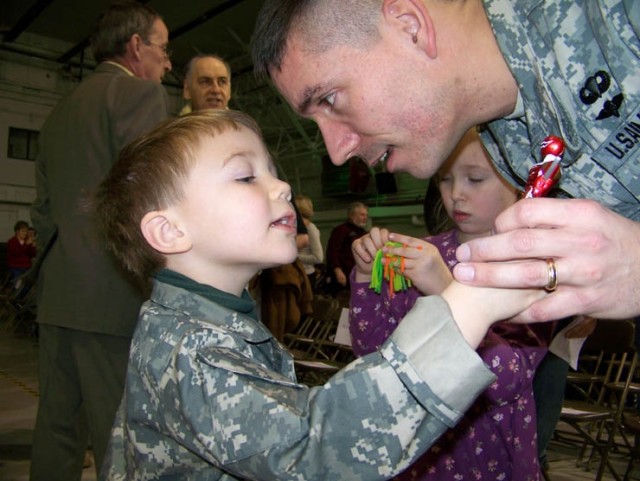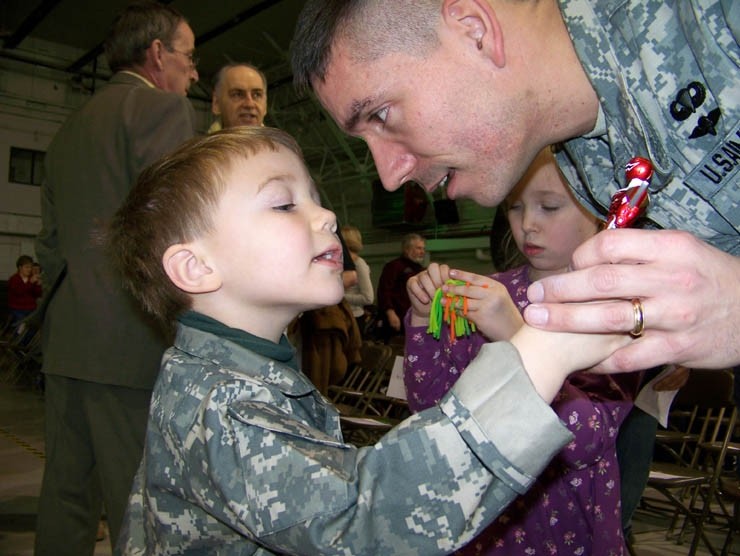
ALBANY, N.Y. (Army News Service, Aug. 1, 2008) - Starting today, citizen Soldiers here will now receive mental health screening thanks to a new partnership between the New York State Division of Veterans Affairs, New York State Office of Mental Health and the New York State Division of Military and Naval Affairs.
The state agencies coordinated with the federal Department of Veterans Affairs to plug the screening process into the existing New York Army National Guard Yellow Ribbon Reintegration Program.
National Guard Soldiers of Company B, 3rd Battalion, 126th Aviation Regiment from Rochester, N.Y., who returned from Afghanistan last spring, are scheduled to meet with clinical representatives from the U.S. VA Vet Centers to receive post-traumatic stress disorder and traumatic brain injury screening during their welcome home reintegration. Vet Centers across the state will support the effort with trained and licensed staff to help returning Soldiers make the transition to citizen Soldier.
"Adding our Vet Centers and their clinical-screening capability into the mix of the National Guard's reintegration efforts takes New York's programs to assist its returning Guardsmen and their families to unprecedented levels of support and care for their well-being," said Jim McDonough, Director of the New York State Division of Veterans' Affairs. "This is exactly the type of cooperation between state and federal government that our veterans expect of us."
The Vet Centers started this program with returning National Guard Soldiers in New Hampshire in 2004 and have since extended it to Massachusetts, Connecticut, Rhode Island, and Maine, said Dr. James Garrett, deputy regional manager for the U.S. VA Vet Center Northeast Region.
"This program has been very successful in several New England states in identifying Soldiers with readjustment problems and we are happy to expand it to New York," Garrett said. "We consider it a real privilege to be able to speak with these soldiers," he added.
PTSD is anxiety disorder that can develop after exposure to a terrifying event or ordeal such as combat operations. TBI is related to the effects of combat action or wounds impacting a Soldiers' head, especially in the vicinity of improvised explosive devices, artillery or rocket fire.
"As with all health problems, mental health issues are best dealt with early and close to home. Offering mental health screenings as part of the reintegration process will lead to early identification and support for those returning Soldiers who are struggling to deal with the stresses of deployment and war," said Michael F. Hogan, Ph.D., commissioner of the New York State Office of Mental Health.
The Yellow Ribbon Reintegration Program requires Soldiers to be present for paid assemblies at 30 and 60 days after their return from a combat zone, and invites families to attend as well. The sessions are held in a non-threatening, non-military environment, to provide Soldiers and families a chance to share experiences and talk frankly with each other and counselors about their experiences.
National Guard Soldiers are put back in touch with people who shared and understand their experience, at about the time the "honeymoon phase" of their homecoming starts fading. And with their families by their side, they hear about benefits and programs such as veterans' benefits, education and job opportunities and available support networks.
At two months, there are briefings on anger management, substance abuse, compulsive behaviors, financial management and other topics. Army studies have found that these issues occur at about those times. Again, spouses and families are invited along and the National Guard pays for the hotel for this session.
After 90 days, the Soldiers return to regular drilling status and report to their Armory for medical checks and additional briefings.
"The New York Army National Guard launched our reintegration program to help Soldiers make the transition from full-time Soldiers back to full-time civilian less stressful,' said Maj. Gen. Joseph Taluto, the Adjutant General and commander of the New York National Guard. "We welcome the efforts of the Division of Veterans Affairs and the Office of Mental Health to make this already successful program more effective for our returning veterans."

Social Sharing